- Home
- Peter Carey
My Life as a Fake Page 16
My Life as a Fake Read online
Page 16
I wasn’t sure what this meant, Mem. His treat, or the opposite?
They saw your man, said Chomley.
Chubb’s pulse quickened.
Your daughter too, he said, taking the dazed Australian’s sleeve and pulling him out of the path of a blue Hin bus, and then urgently forward across Farquhar Street, where outside the Morris dealers he settled his Craven A into a long ivory holder.
Please, what has happened?
They were staying at Batu Ferringi, but they are in the jungle now.
Why would they do that?
The Tamil shrugged. Perhaps they are communists?
Are we going there now? To the jungle?
No, I am sending you to inspect my new roof.
Please, Mr Chomley, do not tease me.
The Tamil again lay his unnervingly feminine hand upon Chubb’s hairy wrist. Call me Mulaha, he said. Much friendlier.
Please call me Christopher.
Christopher! So saying, Mulaha grabbed hold of a snazzy bright-red Vespa which Chubb had somehow connected with the Morris dealers. Christopher, he cried once more, and leapt athletically upon the kick pedal.
Christopher, he shouted, the cigarette holder clenched between his perfect white teeth, it is Saturday. No action now. On Monday morning we will address him an E.S. parcel. He twisted back the throttle. Hop on. Now we cabut.
Cabut, Mem, means to leave the scene, but I was thinking, What is an E.S. parcel, and how will it save my daughter? I would have asked but was trapped on the only Vespa in Penang. Bloody thing flew off the footpath. We landed like a rock. Disaster imminent.
Mulaha, by Chubb’s account, seems to have been in his element. He waved to the rickshawallahs, wobbled, lurched into second gear, and then most definitely cabut up towards North Beach with his passenger’s arms tight around his narrow waist. Years later Chubb would recall the sweet air clinging to his sweating skin, the smells of fish, hawkers’ fires, jasmine, the salty mud flats at the creeks, and all that coral-blue sea off the right side of the road. In 1956 Penang must have been like paradise. Some bungalows here and there, dusty casuarinas, but mostly the giddy smell of a still-unpolluted sea. The Vespa bounced across the bridge at Sungai Babi—Pig River—and passed the Chinese vegetable gardens where the air was thick with the unholy smell of human shit. Then there was a Malay village, and just beyond the last rust-roofed shack, at the foot of that distinctive lumpy hill named Bukit Zamrud, the driver eased the scooter off the road and, without dismounting, walked it slowly into a stand of tall yellow grass.
We leave it here, he said to Chubb. Our little secret.
What is E.S.? You said we would find my daughter with E.S.
Extra Size, said Mulaha, carefully arranging the grasses so as to hide the scooter more effectively. A parcel too big to deliver, he added, fastening the silver buttons on his coat and arranging his pens in a line along his pocket. Come, he said, no peep about the Vespa-lah.
Yes, but how will this E.S. help me?
Now is my day off.
They began walking up a dusty road which rose from the coastal plain and curved around the base of Bukit Zamrud, which from this perspective appeared to be covered in dense jungle.
Before long they came to an elaborate wrought-iron gate with a large enamelled sign: Bukit Zamrud English School.
This, Mulaha said as he unlocked the padlock and unwound the sturdy chain, is a disaster area. Free School is better, Xavier better still, and both are gratis. But here they are shanghaiing the princes from Thailand and Burma. Also any titled youngsters they can find between George Town and Kuala Kangsar.
Chubb looked down on a large wedge of playing field cut like a cucumber sandwich from the rugged landscape. Perched high above on a nubbly hill was a fine three-storied colonial building with arched windows and green wooden shutters.
You like it, Christopher?
Yes.
It is a bloody folly, man. The school board is so desperate to catch the sons of the rajas that the headmaster is making foolish discounts, so even though we now have the desired class of pupils, the school, between you and me, cannot keep up its payments to the chettiars. They’ll foreclose anytime soon, so enjoy it while you can.
The road had now dwindled to twin tyre tracks which circled around until all view of the sea was lost. Here, at the back of Bukit Zamrud, there was no breeze. The jungle was very still: palms, vines, huge trees with buttressed roots pressing so insistently against the ten-foot barbed-wire fence that the concrete posts were tilting inwards.
There is a bright side, Mulaha said. They have no money to call in the thatchers. That is good, you see. I get a gal-iron roof. Much cheaper than the damn attap.
Now the double track became a muddy path and the two men walked in single file with grass brushing their trouser cuffs. Ahead of them, in a tight niche between the high cliff of the hill and the wall of jungle, was a blinding rectangle of silver—Chomley’s new roof.
When we entered, Chubb told me, I thought I’d made a big mistake in coming here. The front room! Cheh. Like an oven. No door or window open. No ceiling, just the blinding naked roof which stank of kerosene.
I am a modern man, said Mulaha.
There were great lumps of attap fallen on his sofa, Chubb said, bits of his old roof. You’d think a man like this would be offended by such a bloody mess, but he did not seem to notice.
See, he said, it is more modern! Here, I’ll show you to your room.
I went, Mem. What choice-lah? It was an oven too, but I could not afford to leave him now.
34
No sooner had they arrived than Mulaha disappeared into a back room and there was nothing for Chubb to do but wait. His own room was unbearable so he returned to the living room and began to release the windows, but immediately found himself opposed by a wizened Chinese ‘house boy’ who followed behind him implacably shutting everything he opened. Chubb turned on the ceiling fan, the house boy switched it off. Chubb attempted a conversation but the man had no English. He sat down on the clear end of the sofa. No books. No food. No water in sight.
So did he rethink his decision to stay?
Who cares I am boiled alive, said the old contrarian. I had rickshaws and postmen. This E.S. I did not yet know how to work; I knew I must wait for it. Mulaha was also most engagé. No, Mem, I know I complained about the heat, but I was happy as a dog with two tails. Kerosene practically dripping from the boiling iron—not even that could disturb my equanimity.
‘Equanimity’ however, does seem exactly the wrong word. I imagine ants and luminescent insects, dispossessed of their thatch, crawling around his feet as he sat there worrying over his remaining currency. Twenty dollars, is this sufficient tea money? No matter what he claimed, it was surely frightening for a man so emotionally exhausted to give himself not so much to the toxic heat but to the buffetings of hope.
The house, he told me, had two bedrooms and a third room, distinguished by a brass padlock, now hanging open from a strong steel hasp. This was where Mulaha had gone, and Chubb now sought him out to ask if perhaps some windows could be opened. But the house boy picked up a bucket, tucked his sarong between his legs and, coming forward like a batsman facing a ferocious fast bowler, began to splash water aggressively towards him. Chubb retreated to the safety of the verandah and here he squatted, native style, with his back pressed against the clapboard wall. In the distance he heard the thwack of a willow bat hitting a leather-cased ball, the first sign that he was on the grounds of a peculiar English school. Staring down into the shadows of the rain forest he was reminded of New Guinea, and when he heard rustling amongst the vegetation he flinched only once, for what appeared before him was a tall man wearing an Australian slouch hat. With the man was a Scotch terrier. When Chubb stood and waved the terrier ran back to his master, yapping fearfully.
The man approached slowly through the scaly shadows, slapping a leash against his leg. He emerged in a patch of blinding sunlight which revealed a very large r
evolver in his hand.
The pistol did not really shock me, said Chubb. What I noticed was he had a great big schnozz, Mem, a totally Aussie schnozz, painted white like a parade-ground rock. It made me homesick, so homely and familiar.
Hello there, said the man.
Hello, said Chubb.
I’m David Grainger.
Christopher Chubb.
Yes, but I mean—I’m the headmaster.
Something in the way he spoke should’ve warned me, Mem, but on the other hand he was Australian. I had been so very pleased to hear the accent that now I made a try for one last joke and said, You’ve been shooting rabbits?
Went down like a bag of warm sick, as they say at home. No response at all. Up the steps he came. The communists have just killed a Christian Brother on Penang Hill, he said, as if I were a shit for joking at such a time. They broke into his school and butchered him.
Is that near here?
He didn’t bother answering. Do you have a weapon? he said.
No.
He stepped inside the house and talked to the house boy in Malay. Did not sound a friendly conversation. On and on he went, with the house boy only answering reluctantly. As for the interrogator, his language sounded like it had been learned in Ballarat.
Mulaha he did not speak to. Too polite, perhaps, to cross the threshold of his private room. But he’s only too happy to grill me. Did I understand the country was in a state of emergency? Was I a friend of Cikgu Chomley?
I said we had just met at the E&O. Wrong thing to mention, it seems.
His eyebrows shot halfway up his forehead. No, he cried. Clapped his big freckled hand onto his head.
I tried to make a joke, said the eggs were so bad I would not return.
He gave me a hard look. You’d be surprised how small George Town is, he said. You do Mr Chomley no favour by taking him to the E&O. A reputation can be easily lost.
Only later did I understand that a Tamil would never go to the E&O, and what had happened that morning was generally thought impossible.
He asked me was I a university man.
Sydney.
B.A.?
Already I disliked him. Kn’ua kuan bo kniua kair, Mem. Looks high, never looks low. A snob. I told him Ph.D., which was one year short of the truth.
Cricket?
A grade, I said. Like county cricket, Mem, for your information. This was a lie as well.
Grainger looked me up and down as if I were a horse he might buy when the price came low enough. Very good, he said. Please inform Mr Chomley to keep a sharp eye out. The police have shut down the train to Penang Hill. He whistled and his Scottie came running. From his pocket he took a greasy-looking lamb bone which he threw into the long grass. The dog took off with its master close behind him.
A moment later Mulaha emerged, no longer in his suit but dressed in a white shirt and white dhoti. He had bushy black hair all up his legs. Master Grainger, he said with a smirk. They call him Mad Mat.
He said there are communists.
Yes, of course. Shame you told him about the E&O.
Sorry.
Not to worry, but you must never let a dog into the house like that. Not your fault, old man, but best keep the door shut.
I don’t like animals in the house either.
It’s this, you see—what if he had died? More than my job is worth.
Why would he die?
Mulaha looked at me.
Take my word. They die.
I thought that a little strange, Mem. But pick up the pen. Gets better.
35
To reach this stage of his story had taken until Wednesday night—that is, just four days before I must leave for London with my treasure. We sat by the Merlin Pool all afternoon and took dinner there, but by midnight we had shifted inside to the Highland Stream, where I was still transcribing, no damned end in sight. On and on he went, often repeating himself and circling back to correct some imagined misunderstanding before, finally, continuing.
In Penang, he said, there is also a Campbell Street. The Chinese called it New Street: Sin Kay. But when you say that in Hokkien it can mean ‘fresh prostitutes’ as well. Mulaha told me this at least four times—his good eye glistening, his enthusiasms clear even before I detected his cologne amidst the flood of kerosene. The delicate little fellow was kutu embun, a dew beetle, coming home at dawn each Sunday. Singsong girls his weekly sport-ah. As for me, I never visited a brothel in my life. Once, perhaps, in Townsville. It was not the tarts that put me off. It was my fellow patients in the repat. Missing arms and legs, some of them, but they would hobble into town and then come swinging back into the ward boasting about their bloody gonorrhea. Aiyo! They had no face, Mem, showing their disease to one another, howling each morning when they peed.
Come, come, said Mulaha Chomley Time for dancing.
No thank you, no Sin Kay for me.
Sin Kay? Sin Kay is finished since the war. But you must visit a certain place. A man in your position. Essential, isn’t it?
His dead eye on me—horrible really, sucked dry of all emotion. This grim organ signified nothing but I supplied a horrid meaning. Made me hot all over.
I asked him what the hell he meant to imply.
Releks, man, he said. Steady on.
But I could not forget the stories from my sergeant who served in Egypt. He swore men had sex with kiddies.
Promise it is not her?
Pardon?
My girl? My girl is not in a brothel.
He might have laughed at my hysteria but he did not. They say Malaysians don’t touch, but Mulaha took my sleeve. Releks, he said, and I took that kindness as my right. I had no idea, Mem, how much worse his own suffering was, could not begin to guess what his dead eye saw as he rode his Vespa around Penang. The blazing body of a Tamil merchant, sitting upright with a violent jerk. Flies crawling on Captain Suzuki’s unwashed arm. The fluttering eyelids of a decapitated head. Blood spurting from a neck, rising as high as the roof of the Hong Aun Coffee Shop and Hotel. Yes, yes, Mem. I will explain in time.
In my ignorance I was the proprietor of all pain. He held on to my sleeve and guided me down the wobbly steps and along the muddy path. It was dark now and the lights of the school spilled over the queer-shaped hill and brushed the edges of the jungle. I did not have the sense to be afraid.
We let ourselves out the gate and soon were laying a blanket of blue smoke behind us on the road. Malay Village, Shit Stink Gardens, Chinese Cemetery, Rambutan Plantation, then a sign that had been hidden in the morning sunlight: The True Parrot, glowing green above the tops of the rambutans.
Cabaret only, said Mulaha.
What a lie that was, but never mind. We bounced down a dirt track, then navigated an untidy tangle of parked cars and Chinese trucks, walked past the biggest Sikh you ever saw, crossed Sungai Babi by a rickety footbridge. The air here smelled appropriately of beauty and corruption, foetid river-mud and salty sea. I could hear a woman singing ‘Venus,’ and a lovely syncopated piano. And suddenly, without warning, we were on the edge of a dance floor. No roof at all, just a platform of polished concrete above the lapping sea. The moon was huge and mustard-yellow. Bass, drums, piano, this gorgeous Eurasian woman singing. ‘Venus, Venus, if you will …’
Come, said Mulaha, I spend you.
I thought he meant a drink, but when he returned it was to press a roll of something into my hands.
Tickets for the taxi-girls, he said. I spend you.
Then I saw the so-called taxi-girls sitting in a row along the back, a numbered card held in every lap. One ticket per dance, that’s how it worked at The True Parrot. Upstairs some rooms, just like Chusan and other nightclubs in those days.
Ipoh girls, Mulaha said. Jiggy-jiggy isn’t it?
Ipoh, Mem, is the city where these girls are said to come from. They had gorgeous legs showing through their long slit dresses.
Cannot, I said.
How cannot? But he was not interested in my answ
er for his good eye was already on a tall girl rising from her seat to greet him. Part Malay, lovely almond eyes, a head taller than my jet-black friend, who was in some exquisite way her equal. A lovely, lovely dancer. How I wished to spend my tickets, yet I could not break free of myself. I drank—what else to do-lah?
Believe me, the shy develop expert strategies, as complex as a molecule of haemoglobin. So when the band finished their set I seized the piano for myself and began ‘In the Mood’ with a few flashy runs, then a low boogie bassline. Shy, not shy, how can I explain it? A show-off. Repeat the bassline but never release the melody, so everyone is waiting for it.
It was Mulaha and his gorgeous taxi-girl, Chubb said, who came to me first. He laid his crisp white handkerchief on the piano and his whisky glass on top. They claim Bertie Limuco had once played that particular piano, but it was well past such polite treatment. Then he stretched out his delicate left hand, the one with the Rolex hanging so loosely from it, and played the single notes of the melody.
Taxi-girls came wanting business-lah. I could not look at them. I upped the tempo. Then Mulaha thinks to toy with me, playing the last note of each phrase after the beat. I can smell women’s powder, perfume, the heat of their lovely foreign bodies. Mulaha’s good eye is very bright. Two girls are dancing with a Chinese gangster in a huge white suit.
Then I put both hands to work. Gorgeous little taxi-girl with an ornate kimono—it would be worth a thousand quid these days—comes and holds a gin and tonic to my lips. I sucked on it as I played. Quinine and gin, they say it stops malaria.
I could go on, but no need. You are a woman of the world, Mem. I made the flowers in the melody and then the band returned and later I made quite different flowers on a narrow hospital bed upstairs. In the middle of my misery I was blessed. Spent all my tickets. First time in a long, long while that I was happy.
We delivered the girls back home to Armenian Street, four of us on a Vespa. Too drunk to fall. I completely forgot my child—but listen. I knew I had been lonely, Mem, yet I had no understanding of my desolation until my skin was finally touched.

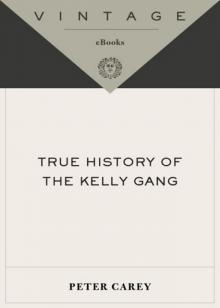 True History of the Kelly Gang
True History of the Kelly Gang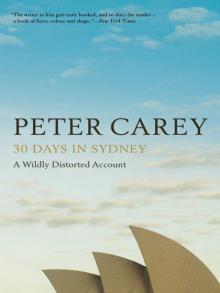 30 Days in Sydney: A Wildly Distorted Account
30 Days in Sydney: A Wildly Distorted Account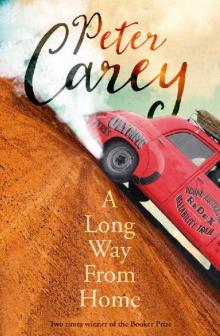 A Long Way From Home
A Long Way From Home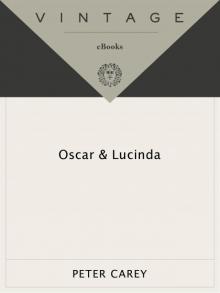 Oscar and Lucinda
Oscar and Lucinda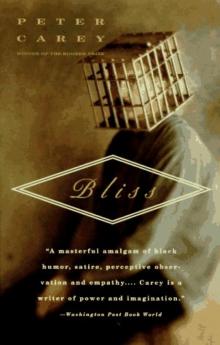 Bliss
Bliss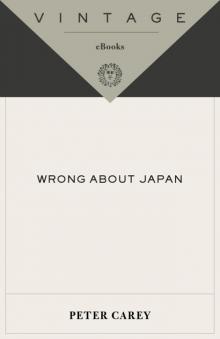 Wrong About Japan
Wrong About Japan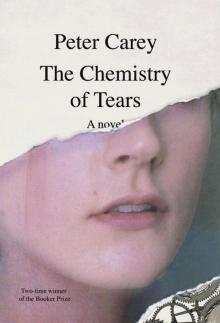 The Chemistry of Tears
The Chemistry of Tears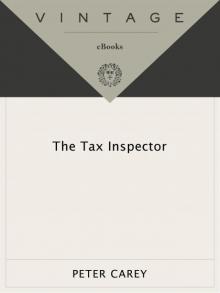 The Tax Inspector
The Tax Inspector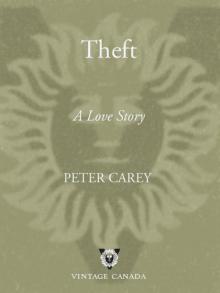 Theft: A Love Story
Theft: A Love Story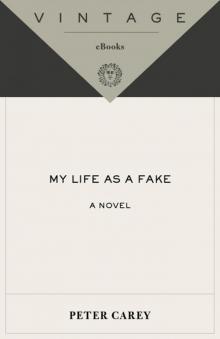 My Life as a Fake
My Life as a Fake Collected Stories
Collected Stories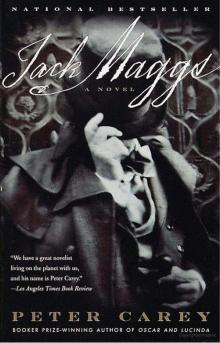 Jack Maggs
Jack Maggs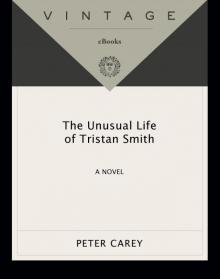 The Unusual Life of Tristan Smith
The Unusual Life of Tristan Smith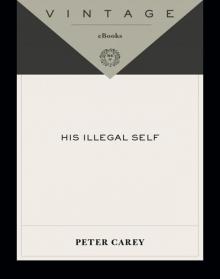 His Illegal Self His Illegal Self His Illegal Self
His Illegal Self His Illegal Self His Illegal Self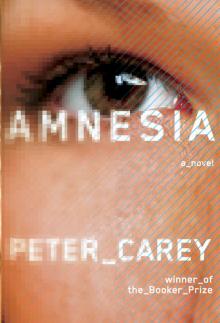 Amnesia: A Novel
Amnesia: A Novel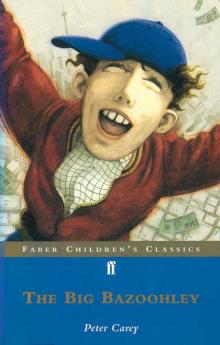 The Big Bazoohley
The Big Bazoohley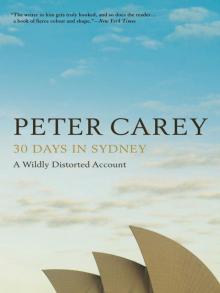 30 Days in Sydney
30 Days in Sydney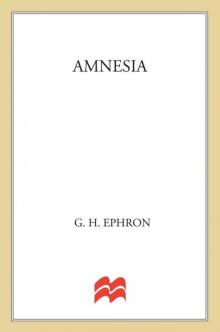 Amnesia
Amnesia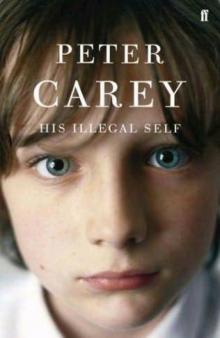 His Illegal Self
His Illegal Self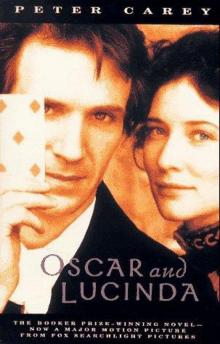 Oscar and Lucinda bw-1988
Oscar and Lucinda bw-1988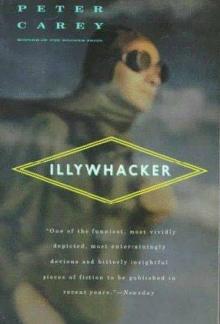 Illywhacker
Illywhacker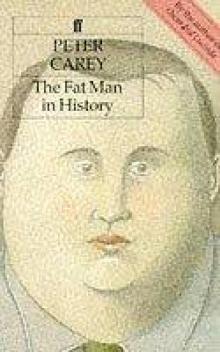 The Fat Man in History aka Exotic Pleasures
The Fat Man in History aka Exotic Pleasures